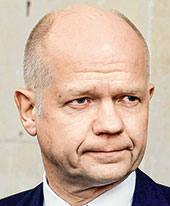London, May 16:
Britain is increasing its diplomatic presence in India by opening deputy high commissions in Hyderabad and Chandigarh, foreign secretary William Hague announced in the Commons yesterday.
Taking into account the high commission in Delhi and the deputy high commissions in Mumbai, Calcutta, Bangalore and Chennai, “that will bring the number of our diplomatic posts in India to seven”, he said.
That will “mean that Britain has the most extensive diplomatic network in India of any diplomatic service in the world,” he added.
In Hyderabad and Chandigarh, Britain has hitherto had trade offices, as it continues to do in Pune. In Goa, there is a British tourist assistance office.
Calcutta is important for promoting cultural ties but Britain has high hopes, not yet fulfilled, that there will be more bilateral business with Bengal with Mamata Banerjee as chief minister.
Hague’s sweeping overview yesterday of Britain’s role in the world was an attempt to demonstrate that while the Raj might long be dead and buried, the quip by Dean Acheson, the former US secretary of state, in 1962 — “Great Britain has lost an empire and has not yet found a role” — was no longer true.
In a Commons debate on foreign affairs, following the Queen’s speech on the coalition government’s legislative programme for the next 12 months, Hague explained the case for expanding British diplomatic presence in India.
“Given the growing importance of our relations with India, I can announce today that we have secured the agreement of the Indian government to open new deputy high commissions in the important cities of Hyderabad and Chandigarh,” he said.
“We are intensifying efforts to promote British exports and attract inward investments, with early results,” he pointed out. “In 2011, British goods exports to India increased by 37 per cent, to Indonesia by 44 per cent, to Colombia by 35 per cent, while British exports as a whole last year increased by nearly £50 billion.”
“I announced to the House on May 11 last year that we would substantially reinvigorate Britain’s diplomatic presence overseas,” he recalled. “I believe that there will never be any substitute for a strong British diplomatic service.”
Defending the reallocation of resources at a time of cost cutting, Hague said: “The approach that I have described on India will help to expand our trade and investment relationship by helping British companies, and it will help to deepen our political links with state leaders across India. We are funding this expansion in relation to the emerging powers through the reallocation of Foreign and Commonwealth Office resources, the withdrawal of some subordinate posts in Europe, and the reduction over time of our diplomatic footprint in Iraq and Afghanistan, where security costs are considerable.”
Although China has ticked off Britain because of the meeting Prime Minister David Cameron had with the Dalai Lama, Hague insisted: “It is vital that we develop a strong, frank and open partnership with China, reflecting our growing shared interests and our support for China’s economic success and more active leadership in addressing global issues. Where we differ, such as on human rights, it is vital we continue our dialogue, so by 2015 we will have an additional consulate, 60 more staff and 40 per cent more Chinese language speakers.”
Pakistan merited a single anodyne reference: “The Prime Minister and I welcomed the Prime Minister of Pakistan to London last week for extensive discussions that illustrated the strength and breadth of our enduring partnership.”
source: http://www.telegraphindia.com / Front page> Nation> Story / by Amit Roy / Thursday, May 17th, 2012
